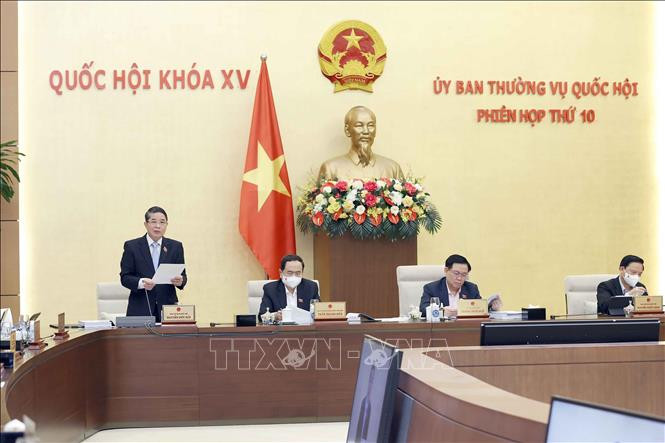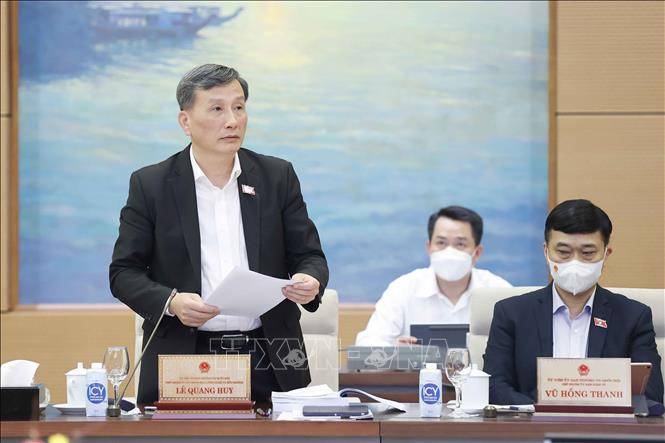Continuing the 10th session, on the morning of April 18, the National Assembly Standing Committee gave opinions on the draft Law amending and supplementing a number of articles of the Law on Radio Frequencies.
Avoid wasting frequency resources
Presenting the Government's Proposal, Deputy Minister of Information and Communications Pham Duc Long said that the goal of the Law is to institutionalize the Party's Resolutions on comprehensively and synchronously perfecting the socialist-oriented market economic system, creating a favorable environment for mobilizing, allocating and effectively using radio frequencies and satellite orbits.
The draft Law ensures consistency with relevant international laws and treaties, including adding 2 articles, amending 15 articles, adding, replacing, and abolishing some phrases in some articles to ensure consistency. The main contents of the draft Law are: Group of issues on frequency band planning, frequency usage licensing, and sanctions for violations; Group of issues on revenue from frequency usage; Amendments to regulations on training and certification of radio operators; Group of issues on radio frequency inspection and control, handling of harmful interference, registration, international coordination on frequencies, satellite orbits, and frequency usage for national defense and security purposes...

Vice Chairman of the National Assembly Nguyen Duc Hai speaks.
Chairman of the National Assembly's Committee on Science, Technology and Environment Le Quang Huy, representing the examining body, said: The Standing Committee of the Committee on Science, Technology and Environment agrees with the necessity of promulgating and the scope of amendments to the draft Law for the reasons stated in the Government's Submission. The contents of the draft Law are basically consistent with the provisions of the 2013 Constitution, ensuring the unity and synchronization of the legal system, and compatibility with relevant international treaties to which Vietnam is a member. The Standing Committee of the Committee requested the drafting agency to continue to refer to international experience to complete the draft Law.
Regarding the limit on the total bandwidth that an organization or enterprise is allowed to use, the Standing Committee of the Science, Technology and Environment Committee finds that the total bandwidth of mobile frequencies is limited. The more mobile frequencies an enterprise owns, the more competitive advantage it has. If there are no regulations on the total bandwidth limit, an organization or enterprise may own too many telecommunications/frequency resources, reducing or even eliminating the competitiveness of the telecommunications business and service market. Therefore, it is necessary to have regulations on the total bandwidth limit that an organization is allowed to own and use to avoid the situation of monopoly acquisition, ineffective use, and waste of frequency resources. This regulation is similar to the regulations that many countries in the world are applying.
However, some people think that the bandwidth should not be limited because it can affect the market development of businesses and the rights of people in choosing a network operator.
Clearly define the principles and criteria for allocating frequency bands
Discussing at the meeting, members of the National Assembly Standing Committee highly appreciated the Government's preparation process for amending the Law on Radio Frequencies, and the review report of the Committee on Science, Technology and Environment outlined the proposed amendments to the draft Law. The National Assembly Standing Committee agreed to submit the draft Law for the National Assembly to consider and comment.
National Assembly Chairman Vuong Dinh Hue pointed out that radio frequencies are important national assets and are increasingly valuable, especially in the context of the Fourth Industrial Revolution, the development of the digital economy and digital society. Countries all pay attention to and promote the protection of rights, especially national sovereignty over radio frequencies and satellite orbits. Therefore, management must be strict, public and transparent to maximize value for socio-economic development, national defense and security and urgent situations. This is a viewpoint that needs to be thoroughly understood throughout the process of drafting the Law.
Chairman of the National Assembly's Committee on Science, Technology and Environment Le Quang Huy presented the inspection report.
Regarding the issue of limiting the total bandwidth that an organization or enterprise is allowed to use, the National Assembly Chairman said that the regulation needs to overcome the problem of enterprises with capacity not being allocated or being allocated little while enterprises without capacity own, or even own a lot. Therefore, it is necessary to clearly stipulate the principles and criteria for allocation to ensure fairness, transparency, publicity, promote competition, improve quality, and overcome frequency accumulation that causes waste of national resources.
Regarding the method of granting licenses for the right to use radio frequencies, the draft Law continues to inherit the provisions of the current Law, including: Direct licensing; through examination and auction. Chairman of the National Assembly's Law Committee Hoang Thanh Tung said that these provisions are unclear and lack defined criteria.
Mr. Tung cited that the draft Law assigns the Prime Minister to decide on specific frequency bands with high commercial value and demand for use exceeding the allocation capacity determined in the frequency band planning to be auctioned or to be selected for the right to use radio frequencies in each period; to decide on frequency bands used to establish public terrestrial mobile telecommunications networks to be selected for the right to use radio frequencies. However, if the criteria for "specific frequency bands with high commercial value and demand for use exceeding the allocation capacity" are not clear, this will only be an administrative decision and not transparent, and it is not known on what basis the Prime Minister will decide?
Concluding this content, Vice Chairman of the National Assembly Nguyen Duc Hai suggested that the drafting committee continue to review to fully institutionalize the Party's major policies, especially the content of the 13th National Party Congress documents related to the development, management and rational and effective use of radio frequencies to develop telecommunications infrastructure, create a national digital transformation platform, gradually develop the digital economy and digital society; institutionalize and contribute to the goal of having a 5G network covering the whole country by 2030, and all people having access to broadband Internet at low cost.
The Vice Chairman of the National Assembly suggested continuing to review the provisions in the draft Law to ensure consistency with other laws such as the Law on Planning, Law on Public Asset Management, Law on Fees and Charges, Law on Handling of Administrative Violations, Law on Bidding, Law on Investment, Law on Property Auction... to ensure compliance with the provisions of the Law on Promulgation of Legal Documents, to avoid confusion, obstacles and congestion, hindering development when the law comes into effect.
The planning issue must ensure the principles, criteria, standards, and policies for allocating frequency blocks, avoiding waste and unreasonable frequency accumulation; implementing frequency usage commitments, reclaiming unused frequencies or transferring and exploiting frequencies in practice. In addition, consider allowing the use of allocated radio frequencies for security and defense purposes to be combined with the use for socio-economic development purposes; research in the direction that defense and security enterprises using allocated radio frequencies must be responsible for responding to urgent security and defense cases at the request of competent State agencies.
According to the Vice Chairman of the National Assembly, the limitation of the total bandwidth that an organization or enterprise is allowed to use needs to have specific regulations to ensure competitiveness, not hinder the development of the market, enterprises, and people's interests; further analysis and careful assessment of the impact of the spectrum auction plan and the non-frequency auction plan, especially the advantages and disadvantages of the two plans, to submit to the National Assembly for discussion and decision.
Regarding the principle of frequency auction, the Vice Chairman of the National Assembly pointed out that the Law on Auction must be followed. If further regulations are needed, they must be carefully studied, explained reasonably, have basis and consider only regulating conditions to ensure national defense and security, ensuring State management of specific contents of the radio frequency field.
According to VNA